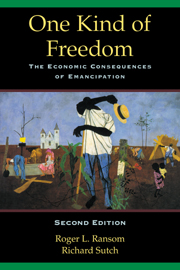Book contents
- Frontmatter
- Contents
- Preface
- Preface to the new edition
- Acknowledgments
- A note to the reader
- Chapter 1 What did freedom mean?
- Chapter 2 The legacy of slavery
- Chapter 3 The myth of the prostrate South
- Chapter 4 The demise of the plantation
- Chapter 5 Agricultural reconstruction
- Chapter 6 Financial reconstruction
- Chapter 7 The emergence of the merchants' territorial monopoly
- Chapter 8 The trap of debt peonage
- Chapter 9 The roots of southern poverty
- STATISTICAL APPENDIXES
- DATA APPENDIX
- Epilogue
- A Bibliography of Literature on the South after 1977
- Notes
- Bibliography
- Index
Chapter 7 - The emergence of the merchants' territorial monopoly
Published online by Cambridge University Press: 05 October 2013
- Frontmatter
- Contents
- Preface
- Preface to the new edition
- Acknowledgments
- A note to the reader
- Chapter 1 What did freedom mean?
- Chapter 2 The legacy of slavery
- Chapter 3 The myth of the prostrate South
- Chapter 4 The demise of the plantation
- Chapter 5 Agricultural reconstruction
- Chapter 6 Financial reconstruction
- Chapter 7 The emergence of the merchants' territorial monopoly
- Chapter 8 The trap of debt peonage
- Chapter 9 The roots of southern poverty
- STATISTICAL APPENDIXES
- DATA APPENDIX
- Epilogue
- A Bibliography of Literature on the South after 1977
- Notes
- Bibliography
- Index
Summary
A new class of houses are springing up … whose conditions of advance are almost necessarily marked by a degree of rigour that was unknown in former times, and that will probably grind and impoverish the mass of poorer cultivators, white and black, for a long period to come.
Robert Somers, The Southern States Since the War: 1870–1 (New York: Macmillan & Co., 1871), p. 198.The rapid ascendancy of the rural furnishing merchant and the importance of his economic role are dramatized by the fact that within several years of the war the merchant had come to dominate the territory in which he operated. His influence extended well beyond the strictly economic life of his corner of the country to all aspects of the rural culture. In fact, the storekeeper, according to Thomas Clark,
was all things to his community…. His store was the hub of the local universe. It was the market place, banking and credit source, recreational center, public forum, and news exchange. There were few aspects of farm life in the South after 1870 which were uninfluenced by the country store.
The economic success of these rural stores had at first seemed to augur well for the farmers of the South. The advantages of having a local supplier were considerable amid the tumultuous changes of the years following the Civil War. But as the merchant consolidated his economic power, he began to be viewed in a different light.
- Type
- Chapter
- Information
- One Kind of FreedomThe Economic Consequences of Emancipation, pp. 126 - 148Publisher: Cambridge University PressPrint publication year: 2001



